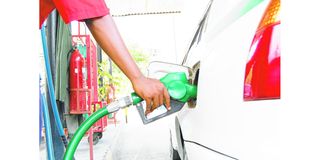Intervals between petrol stations: Food for thought

An attendant refuels a car at a petrol station in Dar es Salaam. PHOTO | FILE
The printed media of 7 September 2022, particularly the Swahili press, reported on the concerns of the Minister for Lands, Housing and Human Settlements Development, Honourable Angela Mabula (MP), over the mushrooming of petrol stations almost everywhere, these days.
If you see a hoarding, chances are, a petrol station, still hidden from view, is under construction. Hoarding is a temporary structure of solid construction erected around the perimeter of construction sites to shield them from view and prevent unauthorized access. Hoardings also carry advertisements.
Addressing Ministerial officials, the Minister wondered why there so many petrol stations everywhere, while town planners and land officers, look on without taking action. The Minister did not mention the Energy and Water Utilities Regulatory Authority, Ewura.
This is not the first time that a Minister for Lands has shown concern over the construction of petrol stations. Way back in 2006, the then Minister for Lands, Hon John Magufuli, showed concern about this topic and vowed to take action, since he considered many of these to be constructed illegally. Nevertheless, the petrol station being currently constructed, have all the necessary permits.
They display their building permit numbers, suggesting that they have gone through a rigorous checklist, involving the legality of land use, as well as other requirements from TRA, local governments, Ministry of Trade and Commerce, environmental authorities, EWURA and others.
We should be aware that constructing a petrol station is not a cheap affair. Some, if not all, of these, are constructed using loans from financial institutions. Clearly, the investors and financiers have to make sure that they are on the safe side of the law.
The Minister seemed to suggest that there is a regulations that allows 200 metres between petrol stations.
She was unhappy with this and required that it be changed to at least 500 metres from one petrol station to another.
She cited public safety as the basis of her concern, particularly, in the event of a fire outbreak, which, according to her, could be a disaster, especially where these stations are sited in the midst of highly populated residential areas. This is a major point of concern.
We are aware that Ewura has in place a number of regulations, under the Petroleum Act Cap 392, related to the licensing and operating of petrol stations. Among many other areas, these regulations address safety and environmental issues.
The retailer, for example is required to take adequate precautions to prevent the outbreak of fire, when storing, keeping, handling, using or disposing of a petrol product.
However, the argument is that, if petrol stations are located close to each other, then fire, accidentally happening on one station, could easily spread to others nearby.
This calls for evaluation of the fire precautions and whether, in the case of an accident, fire can be contained and prevented from spreading.
We have shops,including large departmental stores, located close to each other, possibly as a way of benefitting from the economies of geographical concentration.
Some of these may be selling inflammable materials such as gas. We know of fuel tankers travelling over a long distance one behind another. The danger of an accident is always lurking, and this calls for top precautions against fire outbreak.
Nevertheless, there are commercial factors to be taken into consideration. A brand of petrol retailers, may want to have a presence in a certain location, even if there are other retailers.
After all, this goes well with the principles of economies of scale. I was shocked recently, to see two petrol stations in a part of Dar es Salaam, constructed cheek by jowl, next to each other.
They were however, different brands. The retailers themselves argue that, it is the treatment that brings in, and retains, customers. Therefore, more petrol station establishment mean more competition.
Experts on petrol retailing business will tell you that not much profit is made from selling just fuel, but from other conveniences and services on a petrol station.
Thus, locations attracting customers for these other non-petroleum goods and services will attract more investors.
Nevertheless, whether we go for longer or shorter intervals between petrol stations, the safety of the public must take paramount importance, and it is the duty of all the concerned authorities to ensure that, this is the case.
Regulations need not be rigid. They could be evaluated from time to time, and revised, to ensure public safety and efficiency of operations.





